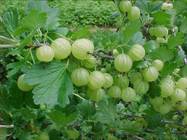North American Gooseberries - bad for biodiversity?

Gooseberries
03 April 2006
North American Gooseberries - bad for bio-diversity?
There has been much public concern about the spread of genes from genetically modified crops into wild plants. Most research has investigated the likely risks of GM genes escaping and how far they might travel. The conclusion has been that the risks are very low, but inevitably GM genes will probably escape into the environment. The trickier question to answer is – so what?
Research published in the latest edition of the international ecology journal ‘Oecologia' by Dr John Warren and Mr Penri James of the Institute of Rural Sciences, The University of Wales, Aberystwyth, has shown that there are likely to be ecological consequence of the escape of alien genes into the wild, which are difficult to predict.
The research has used the native British gooseberry as a model. Since 1905 the survival of the wild British gooseberry has been threatened by the introduction of the highly infectious American gooseberry mildew. This disease effectively killed the commercial growing of gooseberries in the UK and turned the fruit from a national favourite to something of an unusual novelty.
Since this time many gooseberries grown in the UK have been hybrids between native gooseberries and related American species which are resistant to the introduced mildew. What the scientists in Aberystwyth have discovered is that these introduced resistance genes have the ability to subtly change the ecology of insects which feed on gooseberries in the wild.
Plants containing genes introduced from American gooseberries were found to have larger numbers of caterpillars feeding on them, but these insects were significantly smaller than those feeding on the genetically pure British gooseberries. How this happens is unclear. But Dr John Warren speculates that “it may be related to the fact that the insects involved are highly specific in their feeding habits and they may be less able to thrive on plants containing novel genes”.
The researchers have also discovered that the probability of plants establishing in the wild increases with the amount of backcrossing. Hybrid plants were found to be less likely to survive in the wild, than were backcrossed plants that contained fewer introduced genes. Very little genetic material is transferred in the process of producing a genetically modified crop in comparison to one produced by conventional breeding. Therefore GM plants may contain less un-adapted genetic baggage than conventional crops.
Dr Warren said “If this observation is true of other crops, the implication is that genes may be more likely to spread from GM crops than from crops produced by conventional breeding”.
Dr Warren will be presenting his findings to the Ecological Genetics Group Annual Conference which takes place from the 4th until the 7th of April at the University of Wales, Aberystwyth. This year marks the Group's 50th anniversary, and its return to Aberystwyth means it is visiting the venue of its very first conference in 1956.
Full details of this year’s event can be see online at http://users.aber.ac.uk/jhw/egg50th.html



